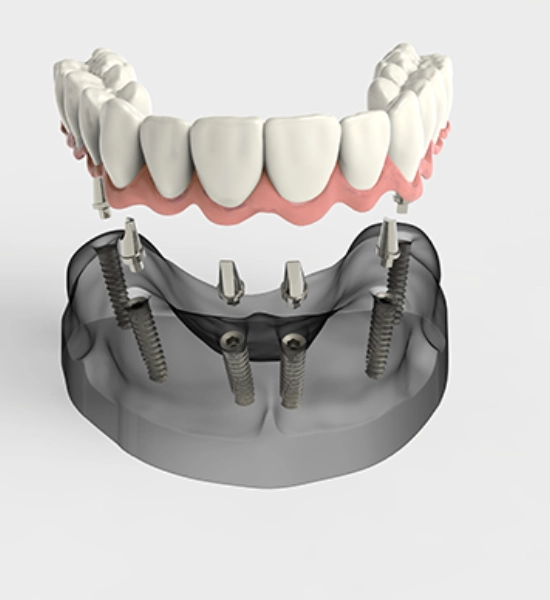Curious about the longevity of dental implants? Understanding “how long do dental implants last” is crucial if you’re considering this modern dental solution for tooth replacement.
‘How long do dental implants last?’ is a common question among those exploring options for restoring their smiles and oral function. Dental implants offer a durable and natural-looking alternative to missing teeth, but their lifespan hinges on various factors.
In this blog, we’ll explore how long do dental implants last, examining the factors that influence their durability and discussing methods to ensure they endure over time.

Factors Affecting How Long Do Dental Implants Last
With over 120 million Americans experiencing one or more missing teeth, finding effective tooth replacement options is important. Dentures were a common solution in the past, but they often caused discomfort and presented maintenance challenges.
Today, dental implants offer a safer and more convenient alternative, sparing patients the hassles associated with traditional dentures. Oral surgeons securely place titanium alloy screws into the jawbone, followed by a healing period of three to four months. Subsequently, patients return to their dentists for the attachment of artificial teeth or implant crowns, achieving a natural and comfortable chewing experience.
Many people consider Dental Implants as ‘permanent solutions’ due to their non-removability, but they do have a lifespan. While they provide a life-like replacement resembling natural teeth, most implants last around 25 years.
Several factors may diminish the longevity of dental implants, including:
- Maintaining Good Oral Hygiene Habits: Just like natural teeth, artificial teeth require excellent dental hygiene. Neglecting oral care can compromise the structural integrity of dental implants and the health of the gums. Consistently brushing and flossing are essential to prevent issues that might shorten the lifespan of your implants. Regular dental visits every four to six months are crucial for optimal results, as dentists can detect potential problems early on, preventing them from escalating into more serious issues.
- Dietary Choices: High-sugar foods can promote decay in natural teeth and compromise the integrity of the ceramic materials attached to implants. Consuming sticky or hard foods can also shorten the lifespan of dental implants by several years. Jaw clenching and teeth grinding are significant contributors to implant failure due to excessive force. Consult your dentist for advice on mitigating these habits or protecting your teeth with a custom night-time hard appliance.
- Location of the Dental Implant: Front dental implants typically last longer than those placed toward the back of the mouth. This is because front teeth endure less pressure from chewing compared to molars. With proper hygiene practices and care, both front and back dental implants can last 25 years or longer.
- Underlying Medical Conditions: How long do dental implants last when a patient has conditions like gingivitis, diabetes, or other underlying oral health issues? Genetics and gum diseases play a significant role in the lifespan of teeth. Regrettably, conditions that diminish bone density or soft tissue in the mouth can prevent the effectiveness of dental implants.
Patients can safeguard their teeth by refraining from tobacco and alcohol. These products can potentially initiate or worsen diseases that harm the gums.
How can dental implants last longer?
Implementing a few simple measures can significantly contribute to the extended durability of your dental implant or implant dentures.
- Maintain routine dental examinations and cleanings.
- Thoroughly brush and floss your teeth.
- Make use of non-abrasive toothpaste and a toothbrush with soft bristles.
- Wear a nightguard to avoid grinding your teeth while sleeping.
- Wear a mouthguard if you are into contact sports, posing a risk of mouth injury.
- Maintain a healthy lifestyle and refrain from using tobacco.
- Don’t bite your nails or hard candy, and avoid using your teeth to open packages.
What Are Mini Dental Implants, and How long do they last?
Mini dental implants involve a less invasive procedure utilizing a smaller metal post for the implantation. However, due to their reduced size and treatment scope, mini dental implants may not be as robust and long-lasting as traditional dental implants.
Similar to conventional implants, there are steps you can take to increase the lifespan of your mini dental implants.
Your dental care practices significantly impact the long-term success of any dental restoration.
Conclusion
So, How long do dental implants last? With proper maintenance through regular brushing and flossing, the implant itself can last a lifetime, provided the patient undergoes biannual dental check-ups. However, the crown typically lasts around 10 to 15 years before normal wear necessitates replacement, though excellent dental hygiene could extend its lifespan beyond 15 years.
The location within the mouth also influences the expected longevity of a dental implant. Implants situated at the back of the mouth endure more strain from chewing, potentially leading to quicker failure than implants near the mouth’s front.
Experience superior dental care with All About Smiles in Canton, MI! Don’t wait; book your appointment online today. For new patients, dial (734) 531-7638, while existing patients can reach us at (734) 981-1199. Your radiant smile starts here.
FAQ
No, dental implants are not for everyone. Your overall health, bone density, and gum condition significantly determine your candidacy.
The recovery period after dental implant surgery varies depending on individual factors such as the number of implants placed, bone density, and overall health. Patients may complain about some discomfort and swelling for a few days after the procedure but are able to perform normal activities within a few days to a week after surgery.
Although dental implants can last a lifetime with good maintenance and frequent examinations, a crown’s typical lifespan is 10 to 15 years, after which normal wear and tear may require replacement.







